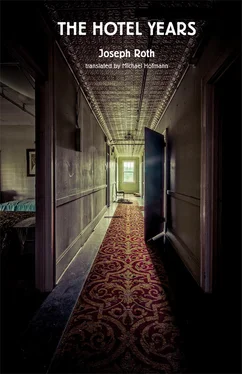Joseph Roth - The Hotel Years
Здесь есть возможность читать онлайн «Joseph Roth - The Hotel Years» весь текст электронной книги совершенно бесплатно (целиком полную версию без сокращений). В некоторых случаях можно слушать аудио, скачать через торрент в формате fb2 и присутствует краткое содержание. Год выпуска: 2015, Издательство: New Directions, Жанр: Прочая документальная литература, Прочая документальная литература, Культурология, Классическая проза, на английском языке. Описание произведения, (предисловие) а так же отзывы посетителей доступны на портале библиотеки ЛибКат.
- Название:The Hotel Years
- Автор:
- Издательство:New Directions
- Жанр:
- Год:2015
- ISBN:нет данных
- Рейтинг книги:3 / 5. Голосов: 1
-
Избранное:Добавить в избранное
- Отзывы:
-
Ваша оценка:
- 60
- 1
- 2
- 3
- 4
- 5
The Hotel Years: краткое содержание, описание и аннотация
Предлагаем к чтению аннотацию, описание, краткое содержание или предисловие (зависит от того, что написал сам автор книги «The Hotel Years»). Если вы не нашли необходимую информацию о книге — напишите в комментариях, мы постараемся отыскать её.
Frankfurter Zeitung
The Hotel Years — читать онлайн бесплатно полную книгу (весь текст) целиком
Ниже представлен текст книги, разбитый по страницам. Система сохранения места последней прочитанной страницы, позволяет с удобством читать онлайн бесплатно книгу «The Hotel Years», без необходимости каждый раз заново искать на чём Вы остановились. Поставьте закладку, и сможете в любой момент перейти на страницу, на которой закончили чтение.
Интервал:
Закладка:
These are the kind of things that happen to you in Germany. Abroad, you read the speeches. They are unimportant. They are rhetorical and political wrecks. They can do little harm and no good. But then in Germany, you see a train conductor eating pralines; a rope in lieu of a pair of trousers; death on two wheels. A clumsy foolishness attaches to these things. Their evident symbolism looks like an invention. Life doesn’t always take the trouble to come up with something convincing. It makes jokes as crass as any music hall entertainer. Who laughs about large, well-off families in Germany making their own money? And using it to buy bread with? It’s a grotesque implausibility in the column of “other news”. A dismal twopenny romance twines round death by starvation. In the West End of Berlin I saw two high-school kids. They were walking along the wide, busy road, arm in arm, like a pair of drunks, and singing:
Down, down, down with the Jewish republic,
Filthy Yids,
Filthy Yids!
And passers-by got out of their way. No one stopped to slap their faces. Not out of political indignation. But because in any other country the irritation of a kid bothering the street with his half-baked politics would have provoked someone to a pedagogic measure. In Germany the convictions of high-school boys are respected. That’s how law-abiding people are in Berlin. And that discipline is heading for a tragicomic ending. Whether it’s a schoolboy treating us to his political views on the Jewish republic or a conductor so hungry he wolfs down a box of chocolates — they are so laughable and tragic that no visitor could understand. No one understands Germany. It is the least understood nation in Europe .
A Japanese student in Berlin told me: when foreign students are matriculated in Berlin University, the rector Professor Roethe says, “We have accepted you, even though you are foreign. Thank God we are not dependent on your friendship…” Do you see a connection between the hysteria of the chanting schoolboys and the speechifying professor? They are both instances of the decline of Germany. That’s the way people in a fever rave. Anyone who has sat at the bedside of a sick patient will know that the hours are not all pathos and anguish. The sick man will talk all kinds of nonsense, ridiculous, trivial, unworthy of himself and his condition. He is missing the regulating consciousness.
That’s just what is missing in Germany: the regulating consciousness.
Frankfurter Zeitung, 9 December 1923
11. Retrospect of Magdeburg
I arrive before midnight. I knew it would be raining, and so it was: diligently and with conviction. Through the draped windows of the cafés streamed a yellowish light, along with muffled drums and cymbals. With a bold show of resolve that was worthy of an actual storm at sea, some customers left the cafés. The silver streetlamps on the empty streets seemed to be there more for the benefit of the rain than the homecomers. Old facades look moving, in amongst the distinctly neutral new buildings, and old street names had a ring of home to me, even though I was seeing them for the first time. Undeniably, the town moved me, before I started to take against it. How a man softens over time! The more you take in, the less you trust the evidence of your senses. Behind the impression given by things, you sense a secret hidden truth you are afraid of violating. No one is as cautious as an elderly mocker, especially when he knows how sensitive the local press and rotary club are. They will deny everything, even impressions! So let’s be conciliatory. In my recollection — a few weeks have passed since my visit to Magdeburg — it has acquired a sheen of melancholy.
Magdeburg’s principal street is Breite Strasse. The name has remained unchanged for a very long time. Its simple but confident assertion seems to me to speak for the good sense of the citizens of Magdeburg. Other towns would long since have given their main thoroughfare a more sonorous name. In that simple unchangingness I sense history and tradition. Germany has few streets in which the character of a historical thoroughfare has remained so clearly visible. Even so, there is a fight going on between the old constancy and the new zealotry, that “ neue Sachlichkeit ” that leaves no place, no movement, no association, no community untouched, disrupting the honest features of the preserved facades with a wilful cool boldness, with smooth, neutral, disagreeably emphatic concrete. Modern apartment blocks are simplistic; in their large windows and flat roofs, the brutal intention of putting space, light and air to work, to save money, and implacably to further the health of man, beast and machine, lives the whole rampant, improving arrogance of our time that knows no self-restraint; and the small towns, afraid they might end up behind the times, instead anticipate them, adopt their tempo, and so make a mess of their best architectural virtues. Opposite the old and really beautiful cathedral set in a dignified and pensive ring of dark green, lurks the Reichsbank building, a gruesome instance of contemporary barrack- and factory-culture, a stone slap in the face, spattered down at the feet of the house of prayer. They are just now in the process of cutting down a few trees giving their own shade in the shade of the cathedral. I would bet that within ten years the vogue for skyscrapers and tower blocks will have utterly destroyed the cathedral square and possibly the cathedral itself. Then the fine café, the Café Dom, a holy temple of ancient chess players where the smoke of innumerable cigars has magically tinted ceiling, pillars and walls, will have given way to a modern “metropolitan” cafeteria of linoleum, glass and chrome, one of those hygienic execution sites with dance music that we have nowadays.
The little booklet in which the town hall of Magdeburg is described is prefaced by an introduction from the mayor of Magdeburg. “To know our town hall is to love it!” he says.
One probably shouldn’t ever take a mayor at his word. But the limited lexicon of human feeling that gives us “love” is surely unable to cope with the enormous dimensions of this town hall. The only feeling I can muster towards this newest of German constructions is awe. This town hall strikes me as a successful effort to construct a palace for the people; the attempt to orchestrate such a thing as the dignity of the masses. The least of the details of this enormous construction is calculated not to let the masses lose human dignity. Wardrobes you don’t have to cluster around. Entrances and exits you don’t have to fight to use, an economical excess of space, space, space, in which all possibility of panic is quenched: this is the masses being educated to self-control. Noble blond wood, no carpeting, plain red and blue velvet curtains; ceilings of silvery brown wood, horizontal bank of lights on the stage, shimmering nickel ornamentation; the biggest organ in Germany (if not the whole world), with ten thousand pipes! It’s a triumph of size, number and utility. The practical is promoted to the ranks of the dignified, and dignity is confusingly close to utility.
On the quiet morning when I wander through the town hall, I am taken with the linguistic play between echo and corridor, and I hear the exaggerated crashing echo of my footfall on the naked boards.* When there are thousands going up and down the stairs on evenings of celebration and joy, then the echo surely won’t sound so hollow, sorry and unfestive. Probably the wood then is just as quiet as carpets would be, it just needs one condition: that a sufficient mass of people be there to walk about on it. When there is just me, I feel like a solitary gymnast. As I leave the town hall and look at the cathedral opposite, I wonder whether I am allowed to say that actually I love carpets, and that bare boards always seem a trifle unadorned to me. I am standing in the so-called exhibition space. Almost every town in Germany now has such a space, in which the excessive numbers of fairs, the tournaments of trade and industry, are held: grassy asphalted spaces, airy filmy walls that in actual fact may have a trusty steel frame within them. So why is it that I feel closer to the fourteenth-century cathedral than to the town hall which was completed in 1927? Why? I can’t tell you. Our grandchildren, of whom the mayor remarks that the town hall will show them what German determination was able to accomplish, may understand me better…
Читать дальшеИнтервал:
Закладка:
Похожие книги на «The Hotel Years»
Представляем Вашему вниманию похожие книги на «The Hotel Years» списком для выбора. Мы отобрали схожую по названию и смыслу литературу в надежде предоставить читателям больше вариантов отыскать новые, интересные, ещё непрочитанные произведения.
Обсуждение, отзывы о книге «The Hotel Years» и просто собственные мнения читателей. Оставьте ваши комментарии, напишите, что Вы думаете о произведении, его смысле или главных героях. Укажите что конкретно понравилось, а что нет, и почему Вы так считаете.












